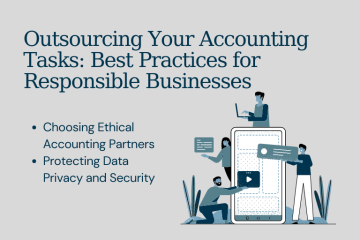In the information age, outsourcing isn’t merely a cost-cutting measure, it’s strategic. Among the most transparent changes taking place across sectors is the transition away from in-house accounting and toward outsourced accounting solutions. Why are so many companies switching? Whether you are new in the business line or an expanding SME or an existing large business shark this trend is redefining the ways in which finance is being managed.
Let’s take you into why this change is taking place and how it might work for your company’s future.
Cost Efficiency Without Compromise
Maintaining an in-house accounting team is expensive. Between office space, benefits, salaries, software licenses and training, costs quickly accrue. Cost reduction was cited by 70% of firms as a key reason for outsourcing, according to Deloitte’s 2023 Global Outsourcing Survey.
Using an outsourced accounting service means you can tap into highly qualified professionals without the overhead. You pay only for the services you need, scaling up or down as your business evolves.
Access to Expert-Level Talent and Technology?
The Outsourced firms specialize in accounting, and that specialization matters. These teams stay very much active on tax regulations, compliance laws and industry-specific requirements. They often try to bring AI-powered tools, real-time dashboards, and advanced analytics that can help the organisation to skip the traditional use of spreadsheets.
| You must know this Insight: Reputable outsourced providers use secure, encrypted platforms and try to look for firms that comply with ISO/IEC 27001 and GDPR standards to keep your financial data safe. |
Plus, many firms have now started to integrate AI-driven bookkeeping and real-time reporting features without you needing to manage the software or training manually with extra efforts.
Scalability and Flexibility
Need full-time support during tax season and part-time help during slower months? Outsourced accounting service adjust to your needs. You’re not locked into fixed headcounts or lengthy contracts.
This level of flexibility is crucial for the budding businesses, especially for those navigating multiple markets.
| Did you know? “Bookkeeping” is the only English word with three consecutive sets of double letters (“oo,” “kk,” “ee”) |
Enhanced Compliance and Reduced Risk
Regulations are ever-changing, and maintaining compliance with tax legislation, labor laws, and report requirements can be overwhelming for in-house staff. Non-compliance may result in penalties, audits and even loss of reputation.
Outsourced accounting companies remain ahead of regulatory updates and make sure that your company is in compliance. Their systems are designed to track deadlines, generate accurate reports, and file necessary documentation on time. This proactive compliance approach significantly reduces your legal and financial risks.
Stronger Data Security and AI-Conscious Practices
Worried about handing sensitive financial data over to a third party? That’s a valid concern, but many outsourced accounting providers have stronger data security protocols than small or mid-sized in-house teams. Top firms invest heavily in encryption, secure cloud storage, access controls and regular security audits.
Additionally, new companies are becoming increasingly AI-aware not only in embracing automation tools but also in safeguarding their information against algorithmic exploitation. If you worry about what AI is being utilized for in making financial choices, a good outsource partner will keep their tools open, how they handle your information and how AI decisions are monitored by human specialists.
Real-Time Access and Transparency
Many business owners worry that outsourcing means losing visibility into their finances. In practice, the reverse is usually the case. From outsourcing accounts payable to handling user-friendly dashboards, real-time reporting facilities, and constant access to finance figures enabling you to make decisions anywhere, at any time.
You are able to see cash flow, monitor invoices, and view key performance indicators (KPIs) from one login. This type of visibility is difficult to beat with more traditional in-house arrangements, where information is frequently fragmented across systems or dependent upon one or two people.
Real-Time Tech Stack Integration: The New Standard
In the era of cloud-native businesses, technology has redefined what accounting can look like. New outsourced accounting companies don’t merely hold your books but are your technology partner.
Software such as QuickBooks Online, Xero, Zoho Books and FreshBooks is ubiquitous, providing secure access, automated reconciliations and AI-based reporting. This software integrates with CRMs (such as HubSpot), inventory applications (such as TradeGecko), payment gateways (such as Stripe) and payroll applications (such as Gusto or Paychex) building a financial system of record.
What’s even more valuable is that outsourced providers often manage the setup and integration of these tools, so you’re not left piecing it together. This saves time, reduces errors and ensures all financial touchpoints are connected.
A Simple Comparison: Inhouse vs. Outsourced services
Let’s break it into an example to know the practical differences between in-house and outsourced accounting service.
Suppose yourself as a owner of growing D2C skincare brand with 1o employees and $1.5M in annual revenue
In-house team setup:
- 1 full-time accountant (₹40,000–₹60,000/month) ($464-$696/Month)
- One-time software purchase (₹1,50,000) ($1742)
- Training and compliance updates (₹20,000/year) ($232/year)
- Manual reconciliation, risk of delay or inaccuracy during busy periods
Outsourced accounting setup:
- Monthly retainer: (₹30,000–₹40,000) ($348-$464)
- Includes accounting software, automated invoicing, monthly reports, year-end taxes
- Team of specialists handles outsourcing accounts payable,GST filings, vendor management, cash flow planning
- 24/7 dashboard access, secure cloud backups
Result: The outsourced model is more cost-effective and scalable. The brand saves 20–30% in accounting overhead and gains access to CFO-level financial planning—something an in-house hire can’t offer without paying premium.
This example clearly shows how outsourcing is not just about delegating tasks—it’s about multiplying impact.
Debunking Common Myths About Outsourced Accounting
Still hesitant? Let’s address some common concerns:
“Outsourcing means I’ll lose control.”
Actually, you’ll gain more control. Outsourced firms operate with SLAs (Service Level Agreements), giving you clear timelines, deliverables and reporting. You get live dashboards and can access reports anytime—often more transparently than waiting on internal updates.
“It’s only useful for small businesses.”
Outsourced accounting scales with your business. From basic bookkeeping to enterprise-level financial modeling and audit preparation, providers adapt as you grow. Many offer modular plans for exactly this reason.
“My data won’t be safe.”
Top-tier firms use bank-grade encryption, two-factor authentication, and cloud storage providers like AWS or Google Cloud. They often exceed the data security levels of in-house setups, where passwords are shared casually and backups are inconsistent.
“AI will replace accountants anyway.”
Not quite. AI can automate transactional tasks, but judgment, strategic thinking, and contextual financial planning still require human expertise. The best outsourced firms combine automation with human oversight
The Thinking Ends Here!
What is the secret for cost saving tactics? No it is not outsourced accounting service but a strategic move towards a smarter, more agile financial management. Working with better access to technology, expert insights and a strong outsourcing accounts payable and other accounting tasks is no longer optional, it’s essential. It’s no surprise that more businesses are moving away from in-house accounting teams and shifting towards outsourcing.
If you’re still on the fence, ask yourself:
- Are my current financial systems helping me grow—or holding me back?
- Am I spending too much time managing accounting, instead of running my business?
- Would a team of experts add more value than a handful of internal hires?



0 Comments